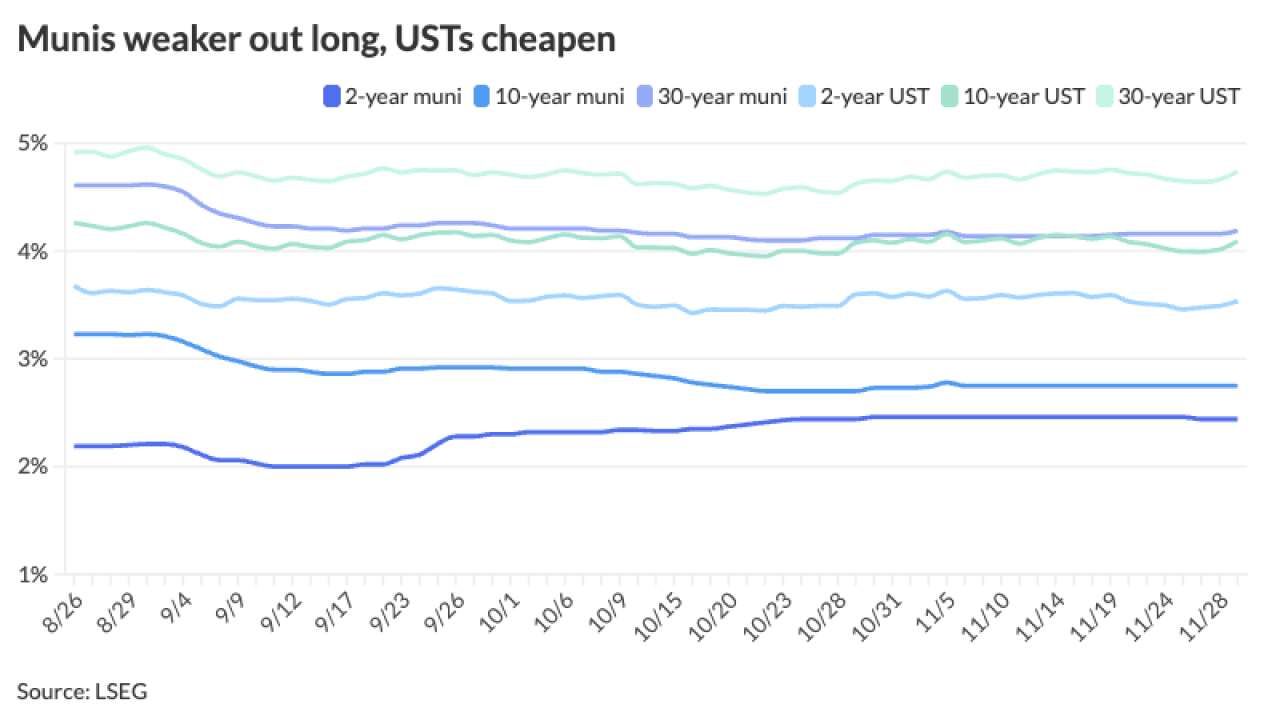
CHICAGO – Genesee County, Mich., officials say they don't expect criminal charges against former Flint leaders stemming from the city's participation in the Karegnondi Water Authority pipeline to impact the project or its bonds.
The four former officials are accused of skirting state law to maneuver Flint into participating in a city- and county-backed bond issue for the authority and its new water pipeline from Lake Huron.
Flint is a contractually obligated participant in the pipeline, which is expected to begin delivering water in October. Flint has pledged to repay about 34% of the $220 million 2014 issue and Genesee County is on the hook for the remainder.
The city's decisions to let its water contract with Detroit expire in 2014 and to use improperly treated Flint River water until the new pipeline was ready led to its water contamination crisis, which has city residents unable to use water from their own taps because of lead contamination.
The crisis has prompted state and congressional hearings, drawn criticism of Gov. Rick Snyder's administration and the state's emergency manager rules, and led to criminal and civil charges.
Repayment of the bonds begins next year and continues through 2043. If Flint misses a payment, Genesee must cover the shortfall. Genesee's backup coverage of Flint's pledge garnered the deal A-level ratings from Moody's Investors Service and S&P Global Ratings – which it retains -- despite Flint's deep fiscal stress at the time.
"At this time we don't foresee this [the charges] impacting bond repayment or the project," said Genesee County Deputy Drain Commissioner Kevin Sylvester, noting that Flint is contractually obligated for its share of the bonds. "We don't see anything changing."
'Sham' Premise
Questions about the legality of the city's participation in the deal were raised in
The complaint accuses the officials of pursuing and winning an emergency state environmental waiver referred to in documents as an administrative consent order, or ACO, on a "sham" premise that allowed the city to participate in the bond deal.
The emergency waiver exempted the bond obligation from being counted against statutory debt caps; the fiscally distressed city had no room to borrow.
That paved the way for state Department of Treasury approval which was needed because it holds the final word over major financial decisions made by emergency managers.
Sylvester said the county could not speculate on potential future legal consequences from the attorney general's allegations involving the alleged false pretenses that allowed the city to participate in the deal.
"Our attorneys are still looking over the complaint," he said.
Bond counsel on the KWA bonds – Miller Canfield Paddock & Stone Plc – did not return a call seeking comment.
The Department of Treasury referred calls seeking more information on the bond approval process and whether the city's pledge remained legal in its opinion to the governor's office.
"At this time we have nothing further to add outside of the statement from the governor's office," a Treasury spokesman said.
The governor's office had no comment beyond Snyder's initial comment after the charges were announced saying the state remained committed to helping Flint recover.
Snyder has come under fire because top administration officials failed to act quickly during the crisis and now two Flint emergency managers he appointed have been charged with criminal wrongdoing. Snyder has not faced any direct allegations of wrongdoing and in an interview Wednesday with the Detroit Free Press said he has "no reason to be concerned" that he faces criminal charges.
The new charges accuse the officials of pursuing the use of Flint River water treated at the city plant instead of other options because it offered the least costly choice, even though the plant was not in a condition to ensure safe water.
"All too prevalent in this Flint Water investigation was a priority on balance sheets and finances rather than health and safety of the citizens of Flint," Schuette said in announcing the charges.
The four charged last week in the ongoing probe Schuette launched in January are Darnell Earley and Gerald Ambrose, both former Flint emergency managers, and former city executives Howard Croft and Daugherty Johnson. They face a mix of felony and misdemeanor charges.
Earley was named EM by Snyder in September 2013 and served until January 2015. Ambrose began working for Flint in January 2012 as finance director for three emergency managers and then succeeded Earley as emergency manager from January 2015 to April 2015. Croft had served as department of public works director and Johnson was utilities director for public works.
All four entered not guilty pleas during their arraignments and vowed to fight the charges.
The charges include acting on false pretenses and conspiracy to commit false pretenses related to their roles in a process that paved the way for the city's participation in the bonds.
Early faces misconduct and willful neglect of duty charges for allegedly making misleading statements that the Flint plant could adequately treat the water and that the water was safe to drink. Ambrose faces similar charges in part for allegedly obstructing a county probe of ties to an outbreak of Legionnaire's disease.
Supply Shift
The crisis occurred after the city's contract with Detroit to receive Lake Huron water ended and the city shifted to Flint River water in April 2014 while awaiting the completion of the new $285 million pipeline that will provide Lake Huron water to Flint and other Genesee County communities.
The city failed to properly treat the Flint River water and in the fall of 2015 shifted back to Detroit-supplied water, but the lead contamination of the city water continued because of pipe corrosion triggered by the improperly treated river water.
The city initially committed to the project in February 2012 in a letter from then-EM Michael Brown to Genesee County; the state treasurer at the time, Andy Dillon, approved the contract in 2013 although that consent did not involve the bonding pledge.
Construction on the pipeline began in June 2013 with plans in the works for the bond issue and Flint committed itself to 34% of repayment. The city however was prohibited from adding debt to its balance sheet under limits imposed by the Home Rule City Act because of its distressed fiscal condition.
EM Earley attempted to win approval in early 2014 but those efforts were rejected. "State law banned the city from accumulating any more debt," Schuette's documents say.
The defendants allegedly then turned to the state's Home Rule City Act emergency bond clause, created to deal with cases of "fire, flood, or other calamity," to enable it to pledge bond repayment without the debt counting against its state law-imposed debt limits.
The defendants sought an administrative order citing the need to clean up a troublesome lime sludge lagoon – holding byproducts of water treatment – in order to upgrade its treatment plant.
The "lime sludge disposal facility was used as a premise for obtaining the funds needed to finance the city of Flint's contribution to the KWA pipeline," the complaint says. "Factually, this was a sham transaction designed under false pretenses to obtain money for the KWA."
In March 2014, the AG's complaint says, KWA's bond counsel emailed Ambrose and Earley saying that KWA was far along in the process of issuing the bonds but could not do so until the Michigan Department of Environment Quality's emergency administrative consent order took effect.
The complaint quotes the email as saying that the MDEQ order was necessary because there was extensive disclosure on the water treatment plant, ACO and Flint's ability to use that plant in the preliminary offering statement and if the KWA project was done to comply with an ACO, the debt associated with the project would not count towards the city's debt limit.
"In order to ensure that the entire project can be financed ….and that the city will have some debt capacity in the future, the ACO is a condition precedent to proceeding with transaction," the complaint quotes the bond counsel's email as saying.
"Put another way, we will cannot (sic) continue with the transaction without the ACO," the complaint quotes the bond counsel's email as saying. "If there is much more of a delay, the KWA will have expended its initial resources and be forced to stop construction and the project will be delayed for at least one construction cycle. Assuming the ratings come in as planned, the city needs the ACO in place by the end of the week."
Ambrose forwarded the bond counsel's email to former Treasury official Wayne Workman, writing: "We greatly appreciate the call made after our last meeting to [M]DEQ by Eric Cline regarding the pending ACO. It has moved along, but still in process. Any additional assistance you an (sic) give would be greatly appreciated."
Workman emailed other Treasury staff on March 19, 2014, and asked, "Can we get a call into the Director [Dan Wyant] to push this through? No one appears to be doubting the need but they can't get to the market without" the order's approval. The ACO, which bound the city to use Flint River water treated at the city's plant, was executed on March 20, 2014.
On April 1, Earley then signed key bond documents that included the bond purchase agreement that included language that the debt was not going to be counted against caps.
The charges accuse Earley of allowing the Flint Water Treatment Plant to distribute the water despite knowledge the plant was not ready for use and making false and misleading public statements that the water was safe to drink. In congressional testimony, he claimed that other officials assured him the water was safe.
"Defendants Earley and Ambrose failed to reconnect to DWSD [Detroit water system], which caused the Flint citizens' prolonged exposure to lead and Legionella bacteria," the Earley complaint says. It says city officials rebuffed Detroit's offer to continue using its treated water from Lake Huron.
The ratings assigned to the KWA bonds are based on Genesee County's GOLT pledge of contractual payments and a step-up requirement should Flint water revenues or Genesee County water revenues fail to cover debt service. The system was established in 2010 and the project includes an intake facility, 63 miles of pipe, and two pump stations. The bond deal was named The Bond Buyer's Midwest Region Deal of the Year in 2014.
JPMorgan, Wells Fargo Securities, and Stifel underwrote the issue. Stauder Barch & Associates was advisor.





